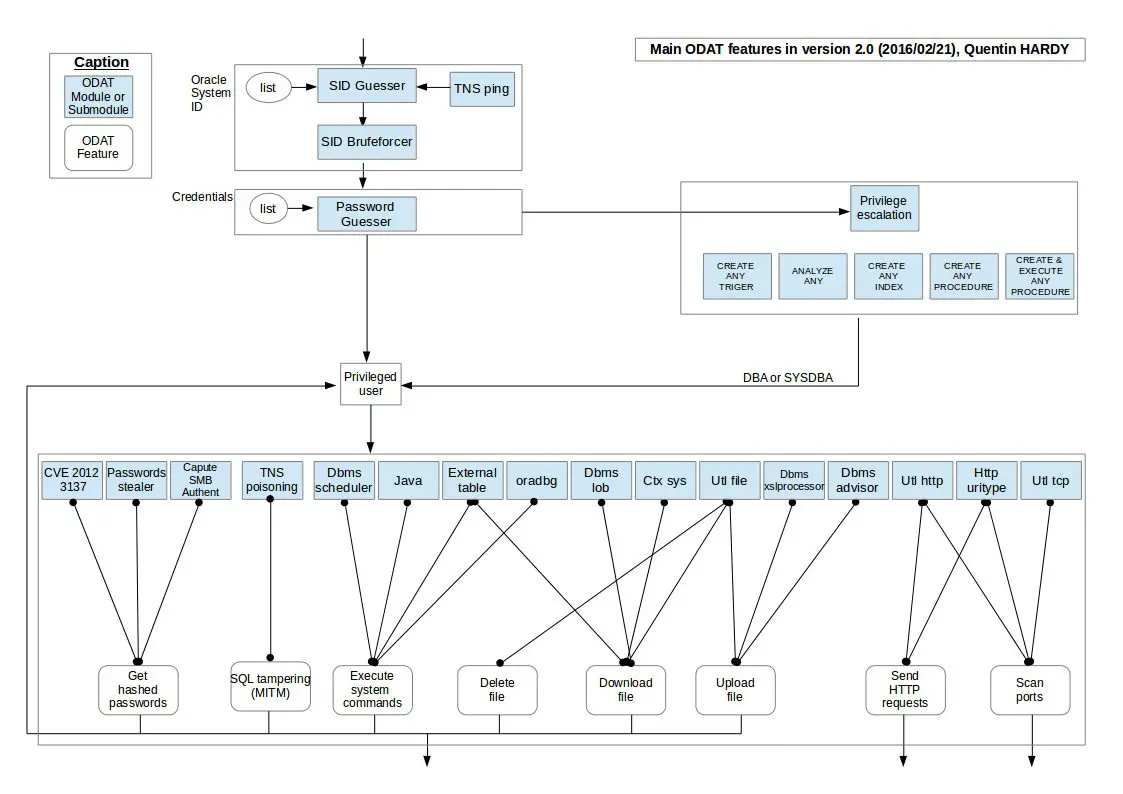
ODAT
ODAT (Oracle Database Attacking Tool) is an open source penetration testing tool that tests the security of Oracle Databases remotely.
Usage examples of ODAT:
- You have an Oracle database listening remotely and want to find valid SIDs and credentials in order to connect to the database
- You have a valid Oracle account on a database and want to escalate your privileges to become DBA or SYSDBA
- You have an Oracle account and you want to execute system commands (e.g. reverse shell) in order to move forward on the operating system hosting the database
Features
Thanks to ODAT, you can:
- search valid SID on a remote Oracle Database listener via:
- a dictionary attack
- a brute force attack
- ALIAS of the listener
- search Oracle accounts using:
- a dictionary attack
- each Oracle user like the password (need an account before to use this attack)
- execute system commands on the database server using:
- DBMS_SCHEDULER
- JAVA
- external tables
- oradbg
- download files stored on the database server using:
- UTL_FILE
- external tables
- CTXSYS
- DBMS_LOB
- upload files on the database server using:
- UTL_FILE
- DBMS_XSLPROCESSOR
- DBMS_ADVISOR
- delete files using:
- UTL_FILE
- gain privileged access using these following system privileges combinations (see help for privesc module commands): (NEW : 2016/02/21)
- CREATE ANY PROCEDURE
- CREATE PROCEDURE and EXECUTE ANY PROCEDURE
- CREATE ANY TRIGER (and CREATE PROCEDURE)
- ANALYZE ANY (and CREATE PROCEDURE)
- CREATE ANY INDEX (and CREATE PROCEDURE)
- send/receive HTTP requests from the database server using:
- UTL_HTTP
- HttpUriType
- scan ports of the local server or a remote server using:
- UTL_HTTP
- HttpUriType
- UTL_TCP
- capture an SMB authentication through:
- an index in order trigger an SMB connection
- exploit some CVE:
- the CVE-2012-3137
- pickup the session key and salt for arbitrary users
- attack by dictionary on sessions
- the CVE-2012-????: A user authenticated can modify all tables who can select even if he can’t modify them normally (no ALTER privilege).
- the CVE-2012-1675 (aka TNS poisoning attack) (NEW : 25/03/2016)
- search in column names thanks to the search module:
- search a pattern (ex: password) in column names
- unwrap PL/SQL source code (10g/11g and 12c)
- get system privileges and roles granted. It is possible to get privileges and roles of roles granted also (NEW : 21/02/2016)
Changelog
Version 5.1.1
- print a warning message when an “ORA-12519 – TNS:no appropriate service handler found” occured. This error can be triggered by the database server (listener) when too many connections have been established (when bruteforcing credentials for example). In this case, –sleep option should be used (e.g. –sleep 0.2).
Download & Tutorial
Source: https://github.com/quentinhardy/
